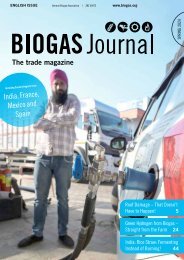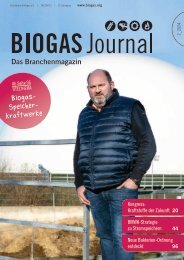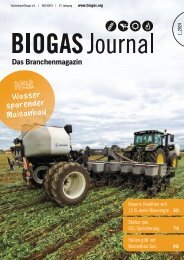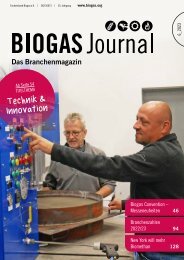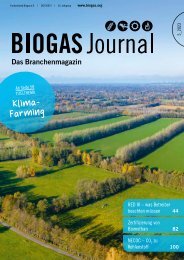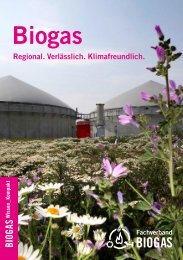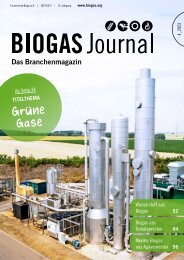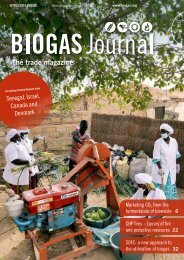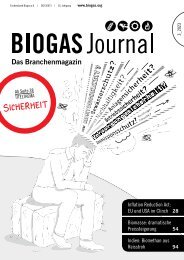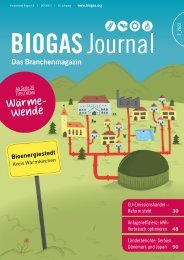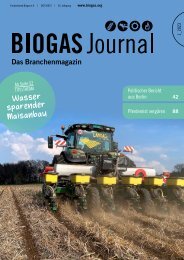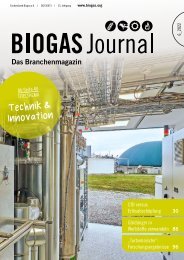Autumn 2023 EN
The German Biogas Association presents its autumn 2023 issue of the English BIOGAS journal.
The German Biogas Association presents its autumn 2023 issue of the English BIOGAS journal.
- No tags were found...
Create successful ePaper yourself
Turn your PDF publications into a flip-book with our unique Google optimized e-Paper software.
<strong>EN</strong>GLISH ISSUE<br />
BIOGAS JOURNAL | AUTUMN_<strong>2023</strong><br />
Goran Knežević and Lidija Carević from the Biogas Association Serbia in the Usce Tower, where the association has its headquarters.<br />
Antje Kramer (right photo) is from the German Biogas Association on a visit to the Serbian Biogas Association in Novi Beograd, a district<br />
of Belgrade. There is a partnership between the associations, supported by the German Federal Ministry for Economic Cooperation and<br />
Development (BMZ) and the climate partnership between Germany and Serbia, which is part of the Balkan country’s preparations for EU<br />
accession.<br />
not regulated or not implemented. Like a statutory regulation<br />
for the feed-in of biomethane. Or liberalization<br />
of the electricity sector. The state-owned monopolist<br />
Elektroprivredav Sribije (EPS) still has a market share<br />
of 97 percent, even though there are more than 70<br />
other providers.<br />
Unused Waste Material Potential<br />
Serbia achieved its share of 26 percent of renewable<br />
energies in 2021, mainly with hydropower. What part<br />
will biogas play in the next phase, 32 percent by 2030?<br />
There is definitely potential. Manure from numerous<br />
livestock farms is still untapped, although most of the<br />
farms are small-scale. Equally suitable are the wastewater<br />
and other processing residues from sugar and<br />
other food industries, as well as the annual organic<br />
fraction of 2.1 million tons from municipal solid waste.<br />
However, silage from corn or other energy crops as a<br />
substrate is facing a crisis, as demonstrated by the case<br />
of Agro Plus Energy.<br />
Global Seed in Čurug reacted to that some time ago.<br />
The way to the dairy farm leads past farmland with<br />
pitch-black soil, vast orchards and settlement villages<br />
dating back to the Habsburg era, with Orthodox and<br />
Catholic churches, wide avenues, lush green areas, and<br />
partly neoclassical house facades. Serbs, Hungarians,<br />
Slovaks, Croatians, Romanians and many other ethnic<br />
groups live in the Voijvodina region.<br />
Using the Envitec plant, Global Seed was one of the<br />
first operators of a biogas facility in Serbia a decade<br />
ago. As the self-proclaimed largest milk farm in Europe<br />
certified with the EU Organic Seal, their primary aim<br />
was to address a waste disposal issue and produce organic<br />
fertilizer for their own fields.<br />
Residual Materials instead of Corn Silage<br />
Five years later, the plant was expanded to a total of<br />
1.27 megawatts. The contents of the large silage warehouse,<br />
however, has been reserved exclusively for the<br />
2,000 cows for several years. Next to the warehouse,<br />
a tank truck from Esotron from Novi Sad, which disposes<br />
of, treats and sells food waste, stops to fill the<br />
tank of the biogas plant with liquid sludge from organic<br />
waste. The mixture of food waste and residual materials<br />
from sunflower and soybean production is mixed with<br />
30 percent cow manure and pumped into the digester.<br />
“That way, we save about 30 percent of the cost of silage<br />
and don’t have to worry about organizing any logistics,”<br />
says the plant manager Konstadin Radonovic,<br />
standing under his umbrella in the courtyard.<br />
So, he can make his plans for the future without having<br />
to worry. Global Seed aspires to be among the pioneering<br />
plants engaging in biomethane processing, positioned<br />
to commence operations as the feed-in tariff for<br />
the initial plant phase concludes in 2024. In addition,<br />
the company would like to provide heat to the nearby<br />
village of Čurug, including the school and other public<br />
buildings. “Unfortunately, there are no regulations from<br />
the government regarding this yet,” says Radonovic.<br />
But several problems are caused by using organic waste<br />
as a substrate. Because each tank load has a different<br />
composition, the plant has to be carefully supervised<br />
and controlled. “The bacteria inside react immediately<br />
to the changing substrate. I neither want to let them<br />
56




